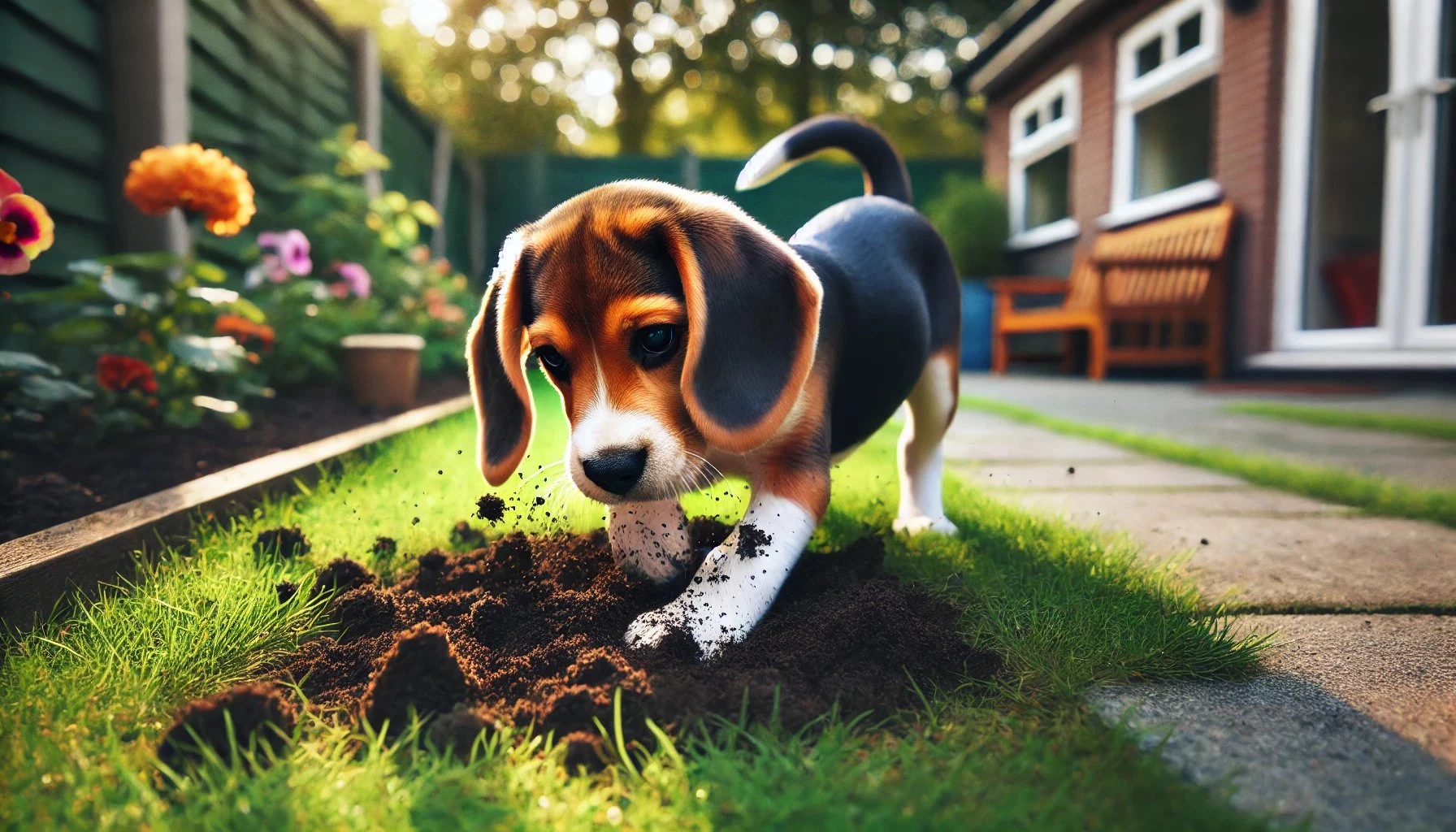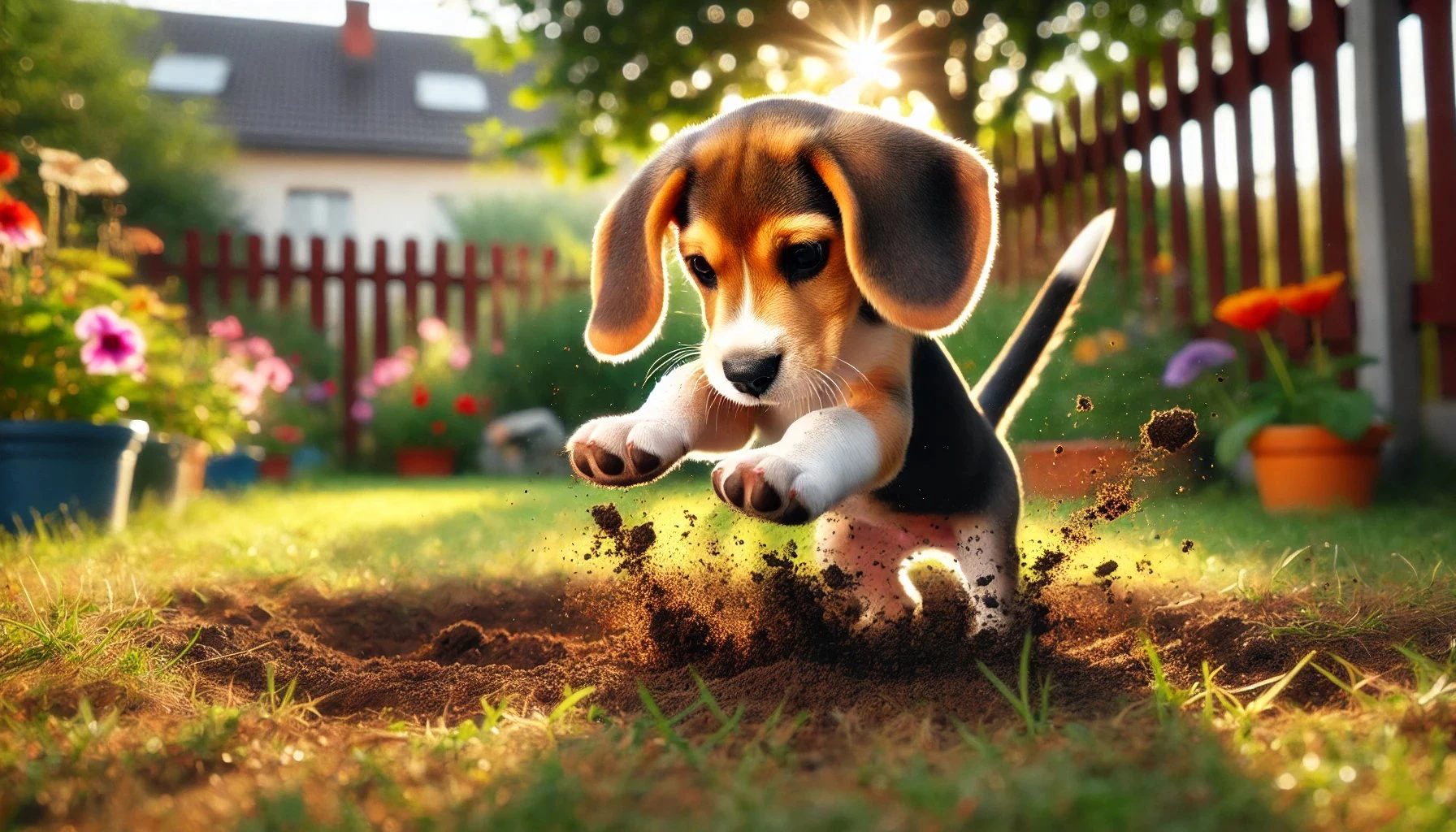On this page
Is Digging Normal for a 7-Month-Old Beagle?
Yes, digging is quite common in Beagles, especially at 7 months old. At this age, Beagles are still curious, energetic, and exploring their surroundings. Digging is a natural behavior, often linked to their hunting instincts, boredom, or excess energy. While it’s normal, it can also become a frustrating problem for you as an owner, especially if your Beagle is digging up your backyard.
In this article, we will explore why your 7-month-old Beagle might be digging, how to stop the behavior, and ways to manage their energy and curiosity more effectively. We'll also provide expert tips on training your Beagle to stop digging, so you can enjoy a well-kept yard and a happy pup.
Why Does My 7-Month-Old Beagle Dig in the Backyard?
Yes, Beagles dig for various reasons, and understanding why will help you address the behavior effectively.
Beagles are known for their strong scent-tracking instincts, and they may dig to find something that smells interesting. Additionally, boredom, anxiety, and excess energy can also drive a Beagle to dig. At 7 months old, they are transitioning from puppyhood to adolescence, which means they may be more active, curious, and in need of outlets for their energy.
Common Reasons Beagles Dig
Hunting Instincts: Beagles are scent hounds, and their instinct to dig might be related to the urge to find something buried, such as a small animal or scent.
Boredom: If your Beagle isn’t getting enough mental or physical stimulation, they might turn to digging as an outlet for their frustration.
Excess Energy: Beagles are an active breed, and without enough exercise, they might dig as a way to burn off energy.
Anxiety or Stress: Changes in the environment, like new people or animals, or even separation anxiety can trigger digging.
How Can I Prevent My 7-Month-Old Beagle From Digging?
Yes, there are several strategies to stop your Beagle from digging, and training is key.
Preventing your 7-month-old Beagle from digging involves a combination of behavioral training, providing proper exercise, and addressing the root cause of the digging. Beagles are intelligent and responsive to positive reinforcement, so with consistent training, you can redirect their digging habits into more appropriate behaviors.
Effective Strategies to Stop Digging
Increase Exercise and Playtime: Beagles need plenty of physical and mental stimulation. Aim for at least 30 to 60 minutes of exercise daily, including walks, fetch, and interactive games. This helps burn off excess energy and reduces the need for destructive behaviors like digging.
Create a Digging Zone: Designate a specific area of the yard where it’s okay for your Beagle to dig. Encourage them to dig there by burying their favorite toys or treats. This will provide an outlet for their digging instincts.
Distract and Redirect: When you catch your Beagle digging, calmly redirect them to an appropriate activity, such as playing with a toy or engaging in training exercises.
Use Positive Reinforcement: Reward your Beagle with treats and praise when they stop digging and engage in the desired behavior. Positive reinforcement strengthens good habits.

Can Digging Be a Sign of Health Problems in My Beagle?
Yes, in some cases, excessive digging could indicate a health issue, and it’s important to rule this out.
While digging is usually a behavioral issue, excessive or compulsive digging might be linked to underlying health problems, such as pain, discomfort, or digestive issues. If your Beagle’s digging behavior is accompanied by other signs of distress, such as lethargy, loss of appetite, or changes in behavior, a visit to the vet is recommended to rule out any medical causes.
Health-Related Causes of Digging
Pain or Discomfort: If your Beagle is experiencing joint pain or an injury, they may dig to alleviate discomfort.
Digestion Problems: Gastrointestinal issues or hunger may cause your Beagle to dig. Ensure they are fed regularly and are not experiencing any digestive distress.
Anxiety: If your Beagle is anxious or stressed, they might dig as a coping mechanism. Separation anxiety or fear of loud noises can sometimes result in digging.
Are There Any Specific Training Tips for Preventing Digging in Beagles?
Yes, training your Beagle with consistent, positive methods can stop digging and prevent future issues.
Training is a powerful tool in modifying your Beagle’s behavior. The key to success is consistency, patience, and making sure that your Beagle understands that digging is not acceptable. Positive reinforcement techniques will motivate your Beagle to learn faster and adopt healthier habits.
Training Tips to Stop Digging
Stay Calm and Patient: Never punish your Beagle for digging. Instead, use calm redirection to guide them away from the digging behavior.
Use “No Dig” Commands: Consistently use a specific command, like “no dig,” whenever you catch your Beagle digging. Praise them when they stop and redirect their attention to something positive.
Teach Alternative Behaviors: Offer toys or engage in games that keep their focus away from digging. Training them to fetch or perform tricks can provide an alternative outlet for their energy.
Consistency is Key: Beagles are smart, but they require repetition to learn new behaviors. Make sure everyone in your household uses the same commands and redirection strategies.

How Can I Stop My 7-Month-Old Beagle From Digging?
Yes, with the right strategies, you can successfully stop your Beagle from digging in the backyard.
Key Takeaways
Digging is a common behavior in Beagles, often driven by their natural instincts, boredom, or excess energy.
Increase your Beagle’s exercise and mental stimulation to prevent them from digging out of frustration.
Training with positive reinforcement, redirection, and providing designated digging areas can help modify their behavior.
Health-related issues may also contribute to digging, so consult a vet if the behavior seems excessive or is accompanied by other symptoms.
Ready to train your Beagle to stop digging? Use Pet Care Super App Pet Care Super App Dosty for expert training tips and advice.
External Resources


